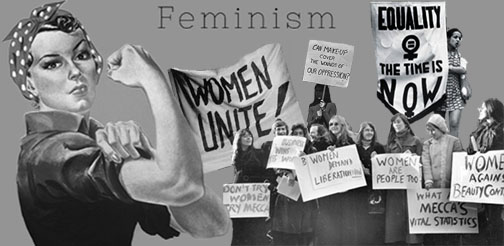Feminism Should be Embraced By Women and Men Alike
December 19, 2014
Most people have been raised on the notion that men and women are equal; it’s a generally accepted fact. Boys and girls are continuously being told they can do anything they want, and they believe it. Why shouldn’t they? Equality seems so obvious that sometimes it doesn’t even look like a worthy topic of discussion, but it is, without a doubt. Unequal treatment and rights of women don’t appear so prevalent because in our culture, it’s disguised as unfair pay and fewer job opportunities.
We have come to use the word and ideals of “feminism” to counteract this battle, but some have a very negative connotation surrounding the term. The word is meant to be all-inclusive, with the opportunity for men to be feminists alongside women for the common cause of equality. It has become an estranged word, however. “Feminism” so noticeably alludes to the root word “feminine” that it may seem like a whole bunch of “woman” is being thrown in people’s faces. That is absolutely not the purpose.
Talk show host Rush Limbaugh so elegantly thought up the term “feminazis,” describing the melodramatic women who alienate the true meaning of feminism, and turn it into a man-hating coven that only aids in the aversion. It’s a fitting name considering all the damage and misconceptions they’ve caused, and these ridiculous notions may be causing women to distance themselves from feminism. Although Limbaugh may not be an admirable activist, his creativity certainly is. Being a feminist means believing that women and men are equal as human beings, and deserve all of the same rights.
That’s it.
I have rarely experienced situations in which I felt I was treated unequally to males, although I think that’s because inequality becomes more apparent in the work force and other social settings. Just because I haven’t noticed it, however, doesn’t mean it is non-existent. As my mother constantly reminded me, the world doesn’t revolve around myself, or any singular person for that matter. According to the Sport, Health and Activity Research and Policy Center for Women and Girls (SHARP), 53 athletic opportunities were offered for every 100 boys, compared with 41 opportunities for every 100 girls. As for classes, Highland math teacher Molly Welch has recognized something.
“In my calculus classes, there are still more males than females, which is bothersome,” said Welch.
Whether this is due to simple lack of interest or motivation from females, (which I find unlikely), or the stigma tied to math and science as “men’s fields” cannot be easily determined, however I don’t believe women are naturally uninterested in science and math.
For decades, men made up the majority of colleges, in both teacher and student status. Since 2000, women have made up about, on average, 50-60 percent of college student bodies, a huge number compared to 1947 when women only made up about 12 percent of the student body. In other words, women have come an extremely long way in terms of education. There is another pressing issue, however. Despite the Equal Pay Act in 1963 following President Kennedy’s lead, women are not receiving equal pay. According to the United States Department of Labor, women earn about 81 cents on the dollar compared to men; a gap that results in hundreds of thousands of dollars in lost wages. For African-American women and Latinas, the pay gap is even larger. Pay discrimination is a real problem that must be addressed, especially because as of 2000, single mothers made up about one-third of the women having children. Considering this statistic, less pay doesn’t just affect the women, it can also
affect their children.
A popular statement surrounding equality is that of, “Of course I believe in equality, but I’m not a feminist.” This stems from the negative aura that has been formed around feminists. So does the title really matter? The answer to that, in my opinion, is no. As long as equal opportunities are being fought for and believed in, the names these ideas are given are simply trivial.
Fair pay isn’t the only issue surrounding women, however. Reproductive rights, violence and sexual assault are among the more popularly debated matters. Reproductive rights have proved to be a very touchy subject, among both men and women. Some argue that since the woman is harboring the baby, she possesses the final decision on whether or not to keep the baby. On the other hand, some say men and women should have equivalent inputs. Both sides of this dilemma are easy to identify with. It can be absolutely devastating to a man if his baby is aborted without his permission, however it can be just as devastating to a woman to be obligated to carry a child she isn’t ready for, or simply doesn’t want. While women’s rights have come a long way in the past decades, there is still improvement to be made. As the issue becomes more and more recognized, progress will ensue, because after all, awareness is key to solving any problem.




























